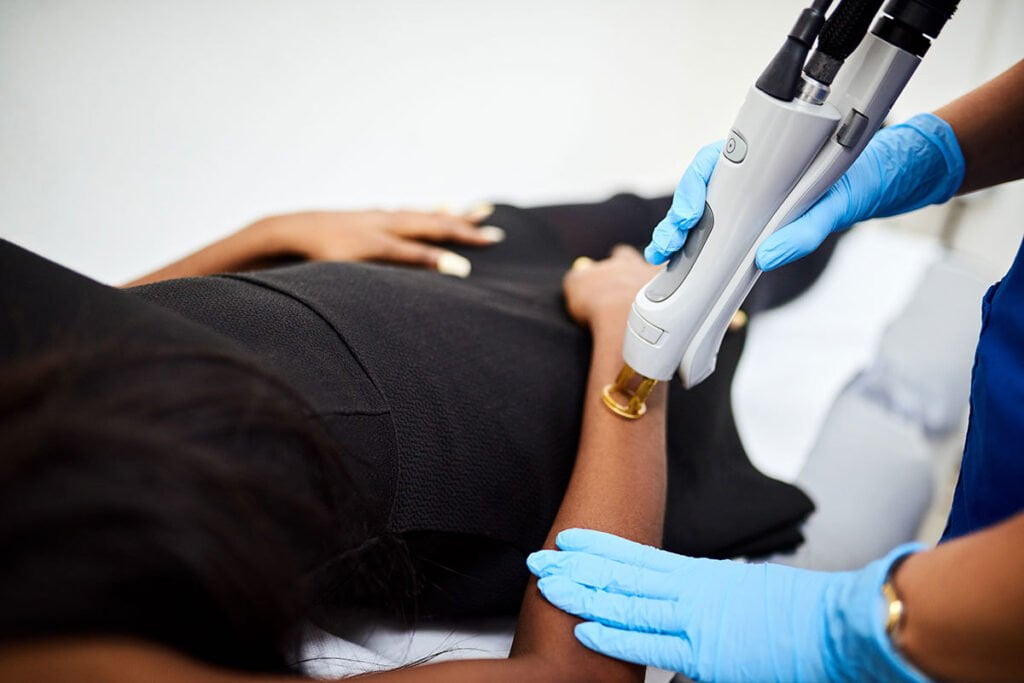Recommendations from Cosmetic Surgeons About Lasers for People of Color

Lasers have been evolving as an aesthetic technology for many years, and they are now one of the prime ways to smooth blemishes and blotchy texture, diminish the appearance of scars, and firm and tighten the skin. But people of color should exercise caution when seeking laser skin treatments because they carry a very real risk of post-inflammatory hyperpigmentation (PIH), particularly when performed by an unskilled provider.
If you are a person of color seeking laser treatments to firm and smooth your skin, here’s what you need to know about the different laser treatments available, how to find a laser specialist, and questions to ask to minimize your risk of an unsatisfactory treatment outcome.
Choose a skilled provider who specializes in lasers for medium and dark skin tones
A 2017 review of clinical studies found that nonablative, fractional lasers can be both safe and effective for skin rejuvenation in skin of color. You may read various sources saying that it isn’t safe, but it’s not that simple: Lasers can be used safely, but the #1 factor influencing how your laser treatment turns out is your choice of surgeon, dermatologist, or laser specialist to complete your treatment. This is because a true specialist will know the best laser options for your skin, as there are numerous options for both lasers themselves and name-brand treatments. They should be well-versed in each laser’s various settings and depths, as well as techniques for selectively focusing the treatment when necessary.
The best lasers for melanin-rich skin
If you are seeking laser therapy as a person of color, know that all lasers resurface your skin by very selectively “damaging” certain skin cells, prompting your body to “heal” the area, flooding it with new collagen. The danger of PIH or even scarring comes into play after treatment, as the body heals itself, a process that can involve the production of more melanin.
PIH can occur after any skin inflammation or damage, from acne, bug bites, psoriasis, eczema, and even allergic reactions. With lasers, PIH is more likely to occur after a laser that targets the shallow epidermis, or skin surface, where melanin is produced. For these reasons, lasers with these characteristics are less likely to cause PIH:
- Look for lasers that are calibrated to selectively target the dermis. Some lasers target deeper layers of tissue (the dermis), while others focus on the top layer (epidermis).
- Choose non-ablative lasers for skin of color. Ablative lasers both promote deep collagen production and remove the top layer of skin, requiring more downtime for your skin to heal; non-ablative lasers, on the other hand, only promote collagen production, and usually require little or no downtime.
- Only undergo treatment with fractional lasers. In fractional laser treatment, the light is broken up into microscopic beams that affect a fraction of the skin at a time, leading to resurfacing with less healing required of your body. Fractional lasers can be either ablative or non-ablative, so choose non-ablative fractional lasers only.
Note that there are many lasers that may be unsafe for you on certain settings. Some lasers are capable of targeting either deeper or shallower tissue, for example, depending on how they are calibrated. This is where your provider’s expertise is critical.
Ask about pre-treatment and alternatives to laser or energy-based treatment
Many providers will offer pre-treatment with pigment-producing cell stabilizers to reduce risk of complications. These topical medications can safely and effectively prepare skin for procedures, as well as improve skin quality, health, and appearance. It is also important to practice careful sun hygiene before and after laser treatment with sunscreen and protective clothing.
An informed decision on any procedure must be based on a consideration of the risks, benefits, and alternatives to treatment. If lasers are too risky, work with your surgeon to find an alternative treatment that achieves your skin goals, such as energy-based radiofrequency (RF) therapy for skin tightening and toning. Some patients are better candidates for non-energy treatments, or their concerns are best addressed without them—chemical peels are a common alternative to laser treatment.
Many providers offer patch testing of lasers on dark skin tones
Thanks to new laser technology and a stronger understanding of how to use lasers on dark skin, laser treatments are available to people of color with lighter skin tones. Unfortunately, those with medium-to-dark skin may run a higher risk of hyperpigmentation with certain laser treatments, especially if the provider is inexperienced with the correct laser settings for your skin tone.
Always request your provider to patch-test their laser(s) of choice somewhere unnoticeable in order to see how your skin reacts to the laser. To be safe, you should wait a period of 48-72 hours to see how the skin reacts before getting a full laser treatment.

Choose a skilled provider who specializes in lasers for medium and dark skin tones.
What to look for in a treatment provider
When you seek medical-grade laser treatments, it’s critical to screen your dermatologist or surgeon who provides this treatment for the following qualifications:
- Board certification in a relevant specialty, namely cosmetic surgery or dermatology
- Skill and precision with the laser device
- Demonstrated knowledge and experience with lasers for people of color
Choosing a medical spa or practice led by a board certified cosmetic surgeon helps to put you in safe and knowledgeable hands. To ensure the practice you choose is experienced, read their reviews, peruse their website, and—importantly—talk with them. Like a consultation for any cosmetic procedure, your consultation for a laser treatment should begin with an open and clear conversation about your goals. The provider should also be able to talk with you expertly about the lasers they have in the office, and the precautions they take in order to prevent hyperpigmentation.
Ask questions before undergoing laser treatment
When you consult with a laser specialist, prepare a list of questions. In addition to your specific concerns that you’ll want to share with them, here are some general questions to start with:
- Will you patch test the laser to see how my skin reacts?
- What is your training background for using lasers?
- How many laser treatment options do you use in this office, and which one would you use on me?
- What are the risks and possible complications of laser treatment?
- Have your patients experienced any complications with laser treatments?
- How many laser treatments have you done?
- How many laser treatments have you performed on people of color?
- Do you have before and after pictures of patients with my skin tone that you have personally treated?
- How do you manage PIH or other adverse reactions?
- How do you use pre-treatment to reduce complications?
Some providers may seem taken aback at first by a well-informed patient, but don’t let this discourage you. If they truly care about your safety and they know about lasers, answering your questions should be routine for them. A huge part of offering cosmetic services is educating patients on their options, and good surgeons or dermatologists are prepared to teach you what they know, listen and understand your concerns, and address them on a human level.
Find a surgeon who takes pride in inclusive practices and safe cosmetic results
Cosmetic medicine has developed a reputation as a white male-dominated field, and for a long time, necessary special considerations were not always taken when treating skin of color. At the American Board of Cosmetic Surgery (ABCS), we prize diversity in aesthetics over cookie-cutter standards of beauty, and we work to foster awareness of the needs of our diverse group of surgeons and patients. To find a surgeon who prioritizes patient safety first, specializes solely in cosmetics, and puts your needs first, look for an ABCS surgeon near you.



